Charlie and the Chocolate Factory
 for quirky situations, action and mild language.
for quirky situations, action and mild language.
Reviewed by: Sheri McMurray
CONTRIBUTOR
| Moral Rating: | Better than Average |
| Moviemaking Quality: |
|
| Primary Audience: | Family Kids |
| Genre: | Kids Family Musical Fantasy |
| Length: | 1 hr. 46 min. |
| Year of Release: | 2005 |
| USA Release: |
July 15, 2005 |
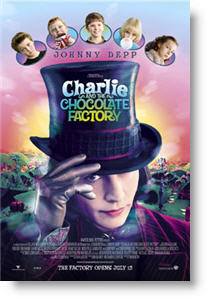
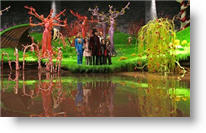
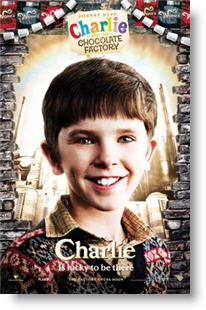
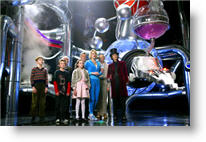
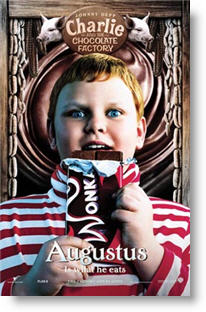
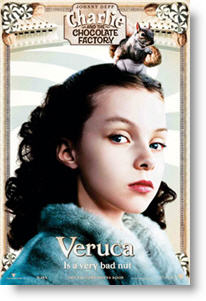
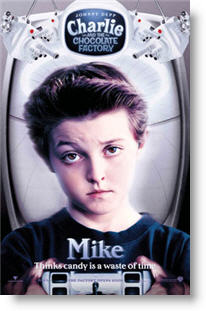
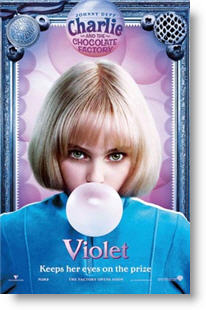
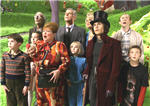
| Featuring |
|---|
| Johnny Depp, Freddie Highmore, David Kelly, AnnaSophia Robb, Helena Bonham Carter |
| Director |
|
Tim Burton |
| Producer |
| Brad Grey, Richard D. Zanuck |
| Distributor |
“There is no place I know that compares to pure imagination.” —Roald Dahl, Willy Wonka and the Chocolate Factory
“Inspiration exists, but it has to find us working.” —Pablo Picasso
Tim Burton has been working on his most beautiful inspiration yet, and if the audience with whom I watched the movie is any indication, “Charlie and the Chocolate Factory” is a very sweet confection indeed—a hardened shell surrounding a gooey and heartwarming center of humor and affection, sprinkled liberally with assorted nuts.
The film’s heart comes from Freddie Highmore (as Charlie), a gifted young performer who had a leading role in “Finding Neverland.” with Depp (who insisted Highmore must play the role of Charlie). Depp doesn’t rely on quirky mannerisms, but creates and inhabits a complete character, an eccentric whose serene facade is a veneer over an inner life of childhood woes. From the TV ads and movie trailers, it may look like Depp has finally lost touch with reality, but in the context of the film, he is right on the money. He is a most fearless actor, always willing to take a chance with his characters.
As a Christian viewer, I see this tale about an eccentric chocolate maker and a boy who embodies all that is good as a first-rate morality tale for children and adults. As you sit there look deep inside the story that surrounds you and drink in not just the lush images, but the spiritual significance that echos our Lord’s warnings about making wrong choices and the inevitable consequences involved.
Here’s the key to understanding choices and their consequences: God has set in motion spiritual laws for human beings that lead to good or bad results, depending on the choices we make. God tells us that if we rise above our selfishness, we build good character. If we fail to understand that, we fail to understand a great deal about God and His plan and purpose for us.
Based on the children’s book by Roald Dahl of the same name, “Charlie and the Chocolate Factory” is about Charlie (Freddie Highmore who’s fine performance is sincere, deep and unforced) a boy from a poor but loving family, who lives in the town where Willy Wonka has his world-famous chocolate factory. Johnny Depp plays Wonka for laughs, of course! His droll sense of humor gets a laugh almost every time he opens his mouth and propels the film along.
Charlie’s family is so poor that they eat cabbage soup every night, and only once a year on his birthday, does Charlie get a chocolate Wonka bar. Both sets of grandparents share the dilapidated home with Charlie’s family, which includes his parents (Helena Bonham Carter and Noah Taylor). 1 Timothy 5:8 tells us our Holy God will take care of our needs. Hebrews 13:20 tells us what this little family knows—that God will provide everything you need.
A leisurely opening, related by Charlie’s favorite grandpa Joe (an endearing David Kelly), tells the history of the Wonka factory, from its beginnings to the fateful day when Willy found his special secret candy recipes were being stolen from the inside. Wonka subsequently fired his workers, grandpa Joe being one, and closed his gates to the public. In the 15 years since then, the factory has magically kept operating, some think through brilliant automation or perhaps some other mysterious means.
Charlie dreams of one day being able to go inside the factory, and his hopes are raised when one day Willy Wonka announces a contest: For five lucky children who find Golden Tickets in their Wonka Bars, the long-locked factory gates will open, and Willy will personally escort them through the factory. A special surprise is promised for only one of them who remains at the end of the tour. With just one day remaining before the tour, Charlie finds a Golden Ticket wrapped within his Wonka bar!
Now we are introduced to the four bratty kids who will vie for the prize: Augustus Gloop (Philip Wiegratz), a portly boy with his mouth constantly stuffed with chocolate; Veruca Salt (Julia Winter), a spoiled rich girl with her daddy wrapped around her little finger; Violet Beauregarde (AnnaSophia Robb), a bratty, competitive gymnastics champion; and angry Mike Teavee (Jordan Fry), a violent TV video-game addict.
Each child comes to the factory with an indulgent parent. Charlie brings his lovable grandpa Joe. As Willy Wonka turns the key in the magical lock of the door that allows this group to enter his world of candy confections, we see the wondrous landscape of chocolate rivers, colorful gumdrop trees, little pink lambs (whose wool is actually cotton candy), and rock candy mountains akin to the rapture felt when Dorothy first opens her door and steps from a world of black and white into a fantastic land of richness and color! Unlike the Wizard of Oz, Willy Wonka is the real deal; nothing in his world is an illusion, including a glass elevator that travels in every direction.
This factory of wonders is run by the Oompa-Loompas who Willy has trained to harvest candy, mine the fudge mountains, and who take the wide eyed group in rowing seahorse-inspired Viking ships through churning rivers of chocolate. Oompa-Loompas (all played by the same actor, Deep Roy) are small, almost lemming-like creatures who are extremely adept at playing ’70s music and capable of dance numbers with a definite Busby Berkley twist.
Willy is remarkably self-controlled. He rarely says what he’s thinking, but the audience can read his thoughts—and his struggle to stay polite, as well as the frequent discord between his thoughts and his demeanor, becomes extremely funny. It becomes funnier, in fact, as the movie goes on. Through flashbacks, we are made aware that Willy Wonka has been out of social circulation for most of his adult life. He lives in his own imagination, surrounded by the Oompa-Loompas, and being around these kids—especially the four brats—is a real strain. It also brings up memories of his own childhood, in which Willy’s father, a dentist played by Christopher Lee, refuses to let young Willy eat any candy. (The dentist father also explains why Willy has blindingly white, ridiculously perfect teeth.) As a boy, Willy ran away from home to go on many adventures and eventually invented the most perfect candy in the whole world.
As the tour travels from one fantastic section of Wonka’s chocolate factory to the next, all four of the nasty children are eventually eliminated by their own greed and arrogance, leaving sweet, decent, innocent and good-hearted Charlie the last remaining tourist and the big winner of Wonka’s ultimate prize! But what is this extremely extravagant extra special reward? What does Charlie teach Willy along the way? That’s for moviegoers to find out, and the trip is well worth the secret!
I can see why Gene Wilder was moved to retract his earlier statement that Warner Brothers was making this film to cash in on the summer box office. After seeing Johnny Depp’s portrayal of Wonka and being exposed to Burton’s movie effects magic, Wilder was enamored with the outcome, hailing Johnny Depp as a “magical” choice to play Willy Wonka. Where Gene Wilder played the chocolate-maker as a fun-loving scamp who enjoys seeing bad little children get what they deserve, Depp portrays a man whose unhappy relationship with his father leads him to withdraw from his dad and go out to seek his own way in the world. By the time he re-enters the public eye, he is guarded about human contact and draws his social skills from a child-like innocence and his personal look from his whimsical, kaleidoscopic view of the world. Like a child who is poiniately honest with those he encounters in life, Wonka just blurts out what he is feeling at the time. Although hard for the adults around him to swallow, in the end, it is a most effective teaching experience for everyone involved.
I found a passing reference to “hell” in the film, but it went by so quickly that I am not sure if it was in reference to the place or to the profanity. I am more inclined to think the “place,” as the whole movie had no swear words, no violence (other than comic), and absolutely nothing sexual. There was a funny scene where someone was alluded to be swearing, but young Charlie’s ears were covered by his parents, and thus the audience couldn’t hear the tirade either.
Charlie wouldn’t give up his family for anything, not even the happiness promised him from Willy, the thought of having as much chocolate as he could ever dream of for a lifetime, or all the unimaginable sums of money offered him by complete strangers for his Golden Ticket. They’re poorer than dirt, but they have loving relationships, and that’s just fine with Charlie. He knows the values in life are not with instant gratifications or material comforts that blow away as quickly as they drop in your lap. We are taught that we must pay for the consequences of our selfish deeds. Selfishness brings bad results. Unselfishness brings good results. The choice is up to us. Within the elements of this film, there is a clear sense of family, respect for elders (and their wisdom), selfless loyalty, humility, love, and honor.
“And so shines a good deed, in a weary world.” —Willy Wonka
There is so much to be noted and learned within this story, that I find it hard to know where to start the comparisons. I commend Tim Burton for his playful and subtle treatment of the subjects, without being in-your-face preachy! Kids will get it, and adults will give a sigh of relief to know they will be able to let their kids enjoy this movie over and over again. If anyone could do it, Tim Burton was the right man for the job. He had already directed “James and the Giant Peach,” another Dahl creation. Burton went to Roald Dahl’s widow and got permission to do a new version of the story that is closer to the author’s original vision. He also made the right choice by giving Wonka a backstory that helps make a little more sense out of how and why he became a peculiar recluse.
With the screenplay by John August and music by Danny Elfman (delivering a knockout score that adds weight and drama to this familiar tale), Daryl Zanuck has proven he knows how to produce a winner (perhaps it runs in the family). Tim Burton again proves he can come up with something wildly unique, even with a story we already know and love. Tim Burton, at the top of his whimsical form, fashions a world of eye-popping colors and cinematic eye candy that shouts, “Turn me into a theme-park ride!”
From the beginning shots of Wonka Bars being produced in the factory to the ending as Charlie and his family help Willy Wonka win something even sweeter than his world renowned candy, I was enchanted. Missing this cinematic confection would be bitterly disappointing.


Good/3½
Good/5
Possible Spoiler: I was very excited to see that Burton left out the soda pop scene from the Gene Wilder movie. The scene in which Charlie and Grandpa Joe drink a new kind of Soda Pop and go floating up to the ceiling. I always felt that the scene contradicted the message of the film. In this new version of the movie, I was able to have discussions with my kids about the importance of family, and doing what is right. The film does a great job at putting these messages across. I would highly recommend this film for any family.
Good/4
Our two daughters ages, 9 and 13, loved the original and liked this one even better. They laughed and cringed and overall had a great time. There is only one reference that I thought was out of line—the squirrel and his nuts. Though I think that it went over most of the children’s heads.
Good/5
This is not “Charlie and the Chocolate Factory” folks; this is: Tim Burton and the Chocolate Factory. Tim Burton took one of my favorite children’s stories and ruined it. Tim Burton was quoted saying of the Roald Dahl story, that there are these “dark subtle messages in the book.” But that’s a lie. No, Tim Burton! The “Charlie and the Chocolate Factory” story wasn’t dark, YOU MADE IT DARK! You made it dark because you are dark. You are a sick, twisted, man, and I only hope the Lord saves you and changes you. Why am I acting like this? I’ll tell you why. In the film, you know when Willy Wonka tells Mike Teavee, when he and the other five children come inside the beginning of his Factory? “Oh,” he says. “And you’re Mike Teavee. You’re the little “devil” that cracked the code and won the third Golden Ticket.” The Willy Wonka that I know and love in the books doesn’t say that! Tim Burton’s not only gone and corrupted the Willy Wonka story, he’s gone and corrupted Willy Wonka himself! In the book, and in the original film (which by the way follows the book ten times more than this despicable remake does), Willy Wonka greets the five lucky children, including the bad ones with the utmost kindness and joy.
…The book is uplifting, cheerful, delightful, profound, and at the end even moving. The Willy Wonka of the books, is amazing in how his admirable characteristics parallel the beloved aspects of our Lord Jesus. He’s kind-hearted, loving, polite, generous, wise, and utterly delightful. But the Willy Wonka that Depp plays is not. He’s mean, freakish, effeminate, and at times Tim Burton tries to make it as if Mr. Wonka wanted the children to get hurt.
In the books, Mr. Wonka, after he… warned the kids and they… disobeyed him and got punished, he would show despair and worry for them, not subtle maliciousness. In the book, the Oompaa Loompaas, who were described as being small little men with rosy white faces and long golden brown hair, with leaf-like clothing, would sing their proverbial songs all to teach the reader to not make the mistakes the four vice-stricken children make, trying to warn them that you reap what you sow. What is Tim Burton’s adaptation of Roald Dahl’s children’s book like? Imagine a beautiful rainbow with all its wonderful colors; in all its pureness, and brightness, and then, imagine a large black crayon, take it, and scribble it all over the rainbow and you’ll have Tim Burton’s adaptation of Roald Dahl’s novel.
Extremely Offensive/1
Good/4
Better than Average/3
I found the notion of “cocoa bean worship” by the oompa loompa’s also unnecessary. Where was the redemption of the oompa loompa character? They went from worshipping the elusive cocoa bean to worshiping the ever present cocoa bean. The oompa loompa’s were rewarded for their worship of idols.
Where was the forgiveness for the children? I’m not sure the children actually learned anything from the cruel punishments inflicted upon them in the chocolate factory. God is a god of forgiveness and has a plan for every action that takes place. What was God’s plan for these children? There is no resolution in the characters of the children—or their parents. The one mother was just mad that her child was blue, she didn’t seem to learn anything at all, but seemed rather inconvenienced that her daughter might have to compete as a “blue little girl.” Christ died as an atonement for the sins of man and thus God does not inflict cruel and unusual punishments upon children for their transgressions. And what was up with the English girl being labeled as “bad.” God said that man is created in his image and that we are good. The sin that results from our human nature is bad, we are not bad. To think of a child being labeled as bad and carelessly chucked into the garbage incinerator. Such blatant disregard for human life and basic Christian principles should certainly not be labeled as a “good family film.”
Average/4
Offensive/1
They enter into the factory, into the room where the Chocolate River is—the room where “everything in it is edible.” One of the children made a mention that not everything in the room was edible—there were people in the room. Wonka replied that it was indeed and such a thing was called cannibalism. The kids you expect to be, well, not so nice. Mike likes to argue, and destroy things. In the same room, Violet’s mother takes a bite from some kind of red flower or bush or something, and then looks directly at the camera. Red oozing all around outside and inside of her mouth as she smiles big; it has all the appearance of blood, even reminding me of some kind of vampire shot.
At one point as Wonka was thinking back to the time that he discovered the oompa loompas, it showed the oompa loompas bowing down and worshipping cacao beans. …These were just a few of the things I objected to. I didn’t like the movie at all. …Nothing God-honoring about it. Not at all a good family film in my opinion. Save your time and money!
Very Offensive/1
To defend Tim Burton, the guy has an AWESOME imagination. There is nothing Satanic in this film, …Weird, yes. But look who is directing and look who is starring, when has either of those two made a “normal” movie? …This movie may not be mainstream enough for you… maybe you need to develop imagination.
Good/5
This film is not child’s play. I am sorry I took my precious children to see this movie.
Very Offensive/2
Other than that, I don’t think much would seriously frighten little kids, but I would hope that parents would be careful in taking there kids to see this. The entire movie looks like a dream, so it would be easy for it to become a nightmare for children. This movie was amazing and I’m definitely going to buy it when it comes out on DVD. One of the best movies of the summer. My favorite thing about it was the innocence of Charlie and his love for his family. It was wonderful!
Better than Average/5
I do think that this is a movie worth seeing, I just can’t believe that people would think that Tim Burton and Johnny Depp were intent on exploiting parallelism’s with Michael Jackson and the like. I never remembered any sleep overs with Willy in this film. I think that the viewers need to remember that children also read the comments that we make here and with all of the spoilers and comments you can take something that a child views as innocent and make them open to the things your trying to safeguard them from.
Better than Average/5
Better than Average/5
One thing to make note of is that this film is not a Christian film. That is a big pet peeve of mine. When Hollywood makes a movie you should not expect it to be Christian. It’s rated PG so that automatically means that it has some sort of objectionable materials. Don’t go griping about how the film did not promote a Christ-like message and you sound all upset that it didn’t. Don’t expect non-Christians to be Christian about anything! If you’re upset that this film didn’t promote any Christian messages or themes then go get a Focus on the Family movie from Lifeway and stay out of the movie theaters!
Better than Average/5
Better than Average/30
So it was interesting that when Wonka discovered Charlie’s commitment and loyalty to his family, he was no longer happy but troubled, as he began to realize what he was missing. Charlie was able to help Wonka overcome his hurt and isolation in a beautiful way, and to begin to create again. Charlie’s character was true to the book and very delightful. He is a virtuous and principled boy, and in spite of poverty, he is contented. His character overshadowed the book and came across clearly in this movie as well. The grandfather also was a delightful and caring person who was extremely interesting to watch.
I disagreed with the poster who wrote that Wonka appeared to want the children to be hurt. He tried to warn them, and then seemed concerned about them when they endangered themselves by not heeding his warnings. In the first film Wilder’s character actually bothered me more in this aspect—as he seemed to whisper, “don’t do that” at times almost inaudibly. I can recommend this film for school age children and families, everyone can enjoy it guilt-free! It was wonderful.
Good/4
Average/3
Good/3½
Better than Average/5
This film is so very, very dark. The only redeeming factor is that the film has a good moral lesson about the importance of putting family first but the spiritual darkness far, far out weighs any good. I felt very oppressed after leaving this movie. Please do not subject your children to this film. My husband and I sat with our mouths open in unbelief at the weirdness and sickness of this movie wondering out loud who and what kind of sick mind would come up with this film. There was a group of gothic teenagers that were bowed over laughing at the film throughout, if that tells you anything.
Please spare your family the spiritual oppression. As a Christian family, we do not consider this entertainment, but gross darkness. The negative personal reviews we have found are not out of line.
Very Offensive/3
Good/4
This is a movie aimed at more the 8-up crowd. It was made so that the kids will like it and the parents would LOVE it. I have never read the book, but I still love the movie. The uumpa-loompas were hilarious, and the opening scene was the best-shot clip I have ever seen. The movie had great values on family.
WARNING: SPOILERS AHEAD: No one else has yet noticed that Willie and his Dad forgave and reconciled in the end. I thought that this is what the original lacked, and made the movie 10 times better. When Charlie refuses to abandon his family, I think that that is the turning point for Willy. I didn’t thing that he was really cruel at all, but just misunderstood. He did warn the children, and they got what they deserve. And from what my parents tell me (they read the book when they were little) Tim Burton actually lightened the story up a little!
Anyway, I loved the movie (PS: If you don’t know what to expect from the burning doll scene, think Indiana Jones and the Raiders of the Lost Ark, at the very end, you know, the white faces, melting eyes, exploding heads, and all that jazz. It’s very humorous, though, and isn’t too offensive.)
Excellent! / 5
In Batman Begins a fight for what’s right and a good vs. evil theme was portrayed. What makes a scene with squirrels scarier than a scene of characters worst dreams envisioned? The element of darkness, confusion, and bizarreness. I would not encourage anyone to go see it. It is a waste of money and leaves you feeling oppressed. This movie should remind us of the truth that the creator of a movie (Tim Burton in this case) has a direct and indirect effect on the movie itself. You know the creator when you see his works.
Very Offensive / 4½
Good/5
Better than Average/5
I highly recommend this to adults and children alike, of many varying ages. I wouldn’t necessarily recommend it for toddlers because it can at time leave a disturbing mark. Though absolutely nothing that would be unacceptable to any other age group. The most questionable scene is the opening of Wonka’s factory to the children. They are presented to by a large amount of puppets much to the same as Shrek’s little welcome song to Duloch. The worst part is not language, nor obscenity in action, they burst into flame during the finale due to poorly down pyrotechnics. Hehe, it was actually quite humorous to me, though again, to toddlers, or those who may act like them, it could be considered slightly frightening.
I rated this very highly because of its excellent film-making techniques and applications, while also supplying the audience with appropriate laughs and great acting. Glad to see some of Hollywood is catching on to the fact that vulgarity doesn’t always sell as we see “Charlie and the Chocolate Factory” rise to 1st in the box office.
As far as morality goes, A+. Great job on it and Christian principles were visible throughout I believe. The official reviewer for the site was right on target.
Good/4
The vibrant yet dark imagination of Tim Burton brought such color and amazing creativity to the film that one could feel so many emotions as well as see the emotions in each character, especially Charlie and his grandpa. Also,Tim Burton embellished the plot to where you understood why Wonka was the way he was.
…there was a bit of language but that was muted because Charlie’s father wouldn’t allow him to hear it from his other grandpa (not grandpa Joe). There was laughter, there were rewards as sweet as the chocolate and lessons bitterly tasted by those deserving of it…
Good/5
Good/5
Still, it’s a good movie for the kids. The cocoa bean worshipping Oompa Loompa thing was just played for laughs and parents shouldn’t really take it seriously.
Better than Average/4
Good/5
Now that I have seen the film, I will proudly say that Johnny Depp has lived and given a renewed and refreshed life to Willy Wonka in both spirit and heart. Every role Johnny Depp has chosen has been qualified in my book as unique and versatile for his career. This role especially will I say has truly brought him out as a very fine actor and more than just an ordinary human being. He brings such refreshing, and I will use that word more than once because it was, humor and vibrant color where there is no imagination and creativity in our world. This goes double for the director Tim Burton because he is the one who sparked for the remake of the original we all love,even made this version into an automatic classic.
There is far too much to see and so little time. I desired to view the entire factory, but as it is,there wouldn’t be enough hours to see such a wondrous factory. Every character justly gets what they want,whether it is the entire factory or it is simply a little lesson that gives a bitter/sweet taste of their own attitudes towards Life.
One thing that gave me a better understanding of Willy Wonka and his indifference to the parental figure was the flashback of his childhood life before chocolate. I never really understood why he was the way he was until I saw the way he was treated as a young boy. I won’t tell you much more than that because I might just spoil something.
…there was just a bit of language, but not that we could hear, and overall it is the most beautiful film I have seen this summer as well as in this time frame of this year. I have yet to be amazed at any other director who can create a better movie for the audience. Gene Wilder would be quite proud of Johnny Depp. I recommend seeing this movie.
Excellent/5
Offensive/1½
Good/4½
Good/4½
Better than Average/3½
Average/5
Good / 4



I found the movie enjoyable and loved Johnny Depp as Willie Wonka—he fit the role perfectly. I would recommend this for school-age children; parents should use their own judgment with the smaller ones as there are a few scenes the little ones could find disturbing.
My Ratings: Average/3½